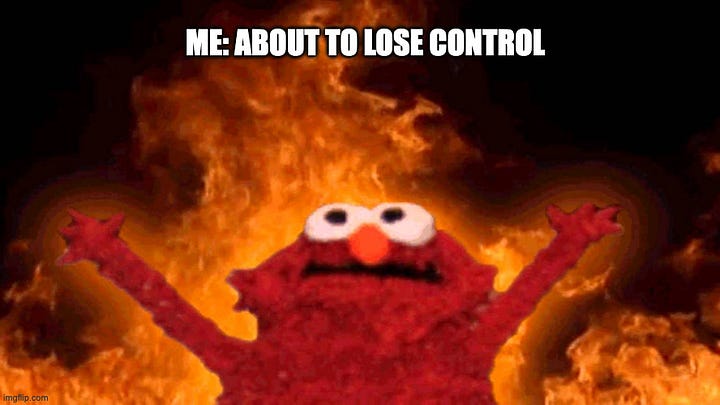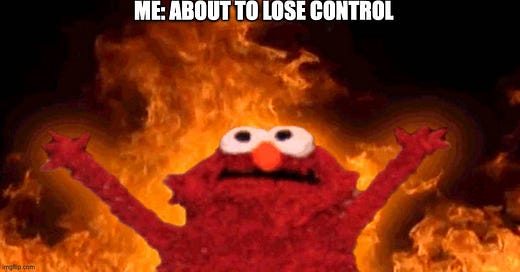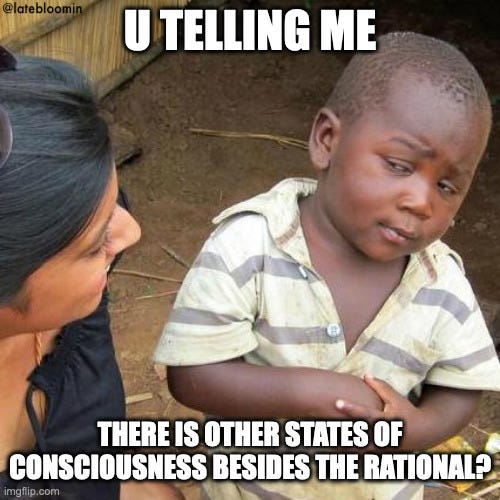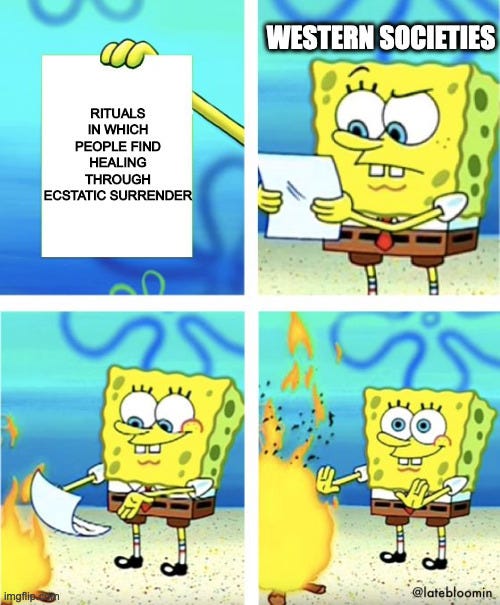rationality over everything - the healing power of not needing to be in control
how Jules Evans brilliant book "The Art of Losing Control" helped me unlearn the rational principles of Western cultures. It illustrates how much we lack rituals of ecstatic surrender
Ever since I can remember, I have learned that rationality is one of the most admired qualities in Western societies. It’s deeply ingrained in me that I should use my mind to problem-solve. As a way of finding belonging and acceptance, I always made sure to showcase my intellect and prove my academic competence. It was part of my mask of identity - my persona - to present myself as intelligent. Thus, I studied Psychology to learn even more about cognition and mental processes. I acquired a lot of useful knowledge, but it certainly didn’t bode well for my one-sided tendency towards heavy thinking.
turning the gaze inward
Sometimes when we turn our gaze inward, we tend to overanalyse our inner world. I noticed that the academic environment even intensified my experience of being “in my head” frequently. Especially in social settings, it was challenging not to get caught up in self-conscious rationality. It really hindered my ability to experience joy and light-hearted fun. I felt trapped in my obsessive thinking and equally disconnected from my surroundings. Thus, I realised I needed to find ways to quiet my mind and cultivate non-rational states of consciousness.
i think, therefore i am
This realisation coincided with my reading of the brilliant book “The Art of Losing Control” by philosopher
, in which he tackles the precise issue of Western culture’s problematic relationship with non-rational states of mind like ecstasy.1 The book is brimming with wisdom and explains that after the Age of Enlightenment, rationality became the only sane type of consciousness. We’re all familiar with the famous quote by Descartes (aka the father of modern philosophy) and his first principle “cogito, ergo sum” (“I think, therefore I am”). Eckhart Tolle classified this quote as an “expression of the most basic error: to equate thinking with Being and identity with thinking”.2The Age of Enlightenment was aptly labelled the Age of Reason. It was the era of rational thinking, while losing control became increasingly shameful. These non-rational states of mind are considered too far beyond the normal - people might think you’re crazy. Ecstatic traits are still associated with primitive, non-Western cultures. Only savages lose themselves in music, surrender to the rhythm, while civilised people remain self-controlled and polite at all times. Evans quotes William James, who recognised as early as the 19th century that rationality is just one mental state in a much wider spectrum of consciousness.
Reading the book and learning about the historical dimensions of rationality felt like a revelation and likewise a relief. Previously, I’ve often felt like there is something wrong with me for being so much in my head and for being too rational. I internalised the shame of struggling to let go, even though our society has taught us for centuries that rational thinking is the only way to go. The book helped me understand that I’m not at fault and motivated me to seek ways to cultivate other forms of consciousness. It encouraged me to unlearn the hyper-rational bs principles of Western culture. I am allowed to not think, to not know, to surrender to the unknown.
Jules Evans’ definition of ecstasy
= an experience where you go beyond your ordinary self
and feel connected to something bigger than yourself
= a profound moment of ego-loss
from the Greek ἔκστασις ekstasis = standing outside (the self)
it’s always work and never love
Furthermore, “The Art of Losing Control” demonstrates that ecstasy can indeed be healing, inspiring and socially connecting. One quote from the book really encapsulates the state of contemporary societies: “secular modernity shaped us into walled-off rational selves disconnected from our subliminal mind, our bodies, each other and from god”. One of life’s greatest joys is feeling connected to something, whether it’s nature, creative work, loved ones, or a higher power. Evans calls this “a sense of identity beyond the I”. It’s kind of tragic that so many people nowadays lead disconnected, joyless lives, having lost their connection to life itself - no fun and play, as Nabibah Iqbal puts it: “It's always work and never love” (Zone 1 to 6000).
We can see this rational hegemony in other areas of society, such as therapy. The go-to treatment is Cognitive-Behavioural Therapy (CBT), a problem-focused, action-oriented form of therapy that has many benefits and is effective for a variety mental health conditions. However, it does not help everyone. Evans notes, CBT only heals about 40-50% of cases of anxiety and depression (though that still means many ppl find relief through it). But the cognitive approach of addressing mental health issues purely by analysing them with the mind might be lacking some other, non-rational methods of healing.
unselfing
This is a distinctly Western approach to healing. Evans illustrates that most cultures around the world have rituals where people find healing through ecstatic surrender -just not in our Western societies - where we have learned to control ourselves and ecstasy is demonised. We’ve all likely experienced how healing collective dancing or being in nature can be. How much more connected to our bodies and to life itself we feel after exercising, or when we are absorbed by something beautiful like music or art. Philosopher Iris Murdoch calls this “unselfing”, when our attention becomes absorbed and we feel deeply connected.
How strange it seems that we in Western societies are so out of touch with these kinds of transcendent experiences. How little we value the healing power of non-rational states of mind, while hyper-rationality can actually harm our well-being and happiness. Even from a rational perspective, our demonisation of ecstasy doesn’t make much sense. Instead, we could offer hedonistic outlets (check the embedded video of the Zion rave at the end of the article to see hedonistic surrender).
Simply understanding that losing control in a healthy way can be healing has already shifted my experience. Knowing that I’m doing myself a favour by allowing myself to let go and not being in control. This mental shift may sound minor, but it has had a big impact on me. I’m less afraid of losing control or even worse - losing my mind. Trusting that by surrendering - I am healing.


dangers of losing control
Ofc, there are also dangers. There is a reason why people are terrified of losing their minds. Evans points out that we may get flooded with repressed aspects of the psyche (= our shadows), which can easily be overwhelming. Additionally, it may lead to ego inflation or an unhealthy obsession with escapism. Evans emphasises the importance of set & setting to guide ecstasy in a moral direction. Values to manifest are: equanimity, humility (through grounding habits), compassion, and integration. He also quotes Jack Kornfield to underline the importance of putting in the hard work to turn epiphanies into habits: “After the ecstasy the laundry”. I wrote this down on the first page of my notebook as a constant reminder.
It’s still a work in progress for me. Sometimes, I can surrender easily. Other times, my ingrained habits of staying in control resurface. Beliefs don’t change overnight, affirmations can be a powerful tool tho, so have a look at my non-rational affirmations below.
Non-rational affirmations (pick the ones that resonate with you):
I free myself from the need to be in control at all times.
I am allowed to not know.
I am allowed to lose myself in the experience & forget everything around me.
I am allowed to surrender to the unknown.
I don’t need to be in control all the time.
I trust the unknown.
I am allowed to not think.
I am allowed to let go.
It is safe to surrender and to not be in control.
I don’t need to understand everything.
I am allowed to lose control.
I free myself from the heavy pressure of staying in control at all times.
I am safe, even when I am not in control.
I feel connected to something bigger than me.
Letting go and surrendering is an act of self-care.
It is healing to experience ecstasy.
Don’t know, don’t need to know.
Trying to control everything makes me tense.
When I let go, I become loose.
It’s not shameful to lose control.
The ability to lose control is a strength, not a flaw.
PS: maybe we need more of this (minus the part where machines are ruling over us):
The Art of Losing Control: A Philosopher's Search for Ecstatic Experience - Jules Evans. It is an amazing book, please go buy it, there is so much wisdom in it.
The Power of Now - Eckhart Tolle. There is some debate about the true meaning and interpretation of the quote, especially the translation of the Latin term “cogito”, which some people translate as ‘perceiving’ rather than ‘thinking’.







I am a certified control freak, so actually this is very useful to think about. The benefits from losing control exist in their own context and right experiences.